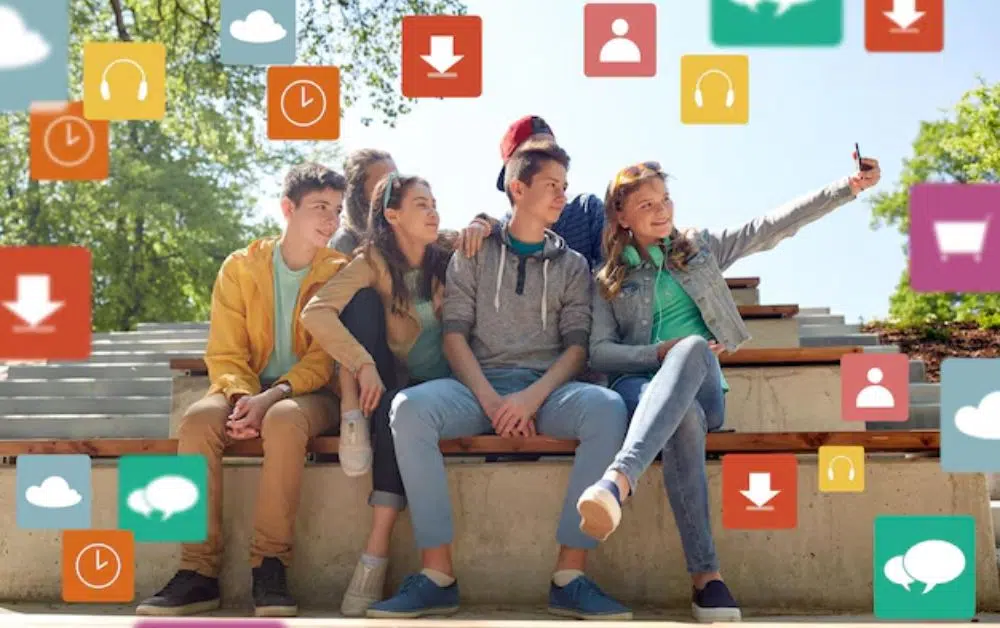Social media has become a big part of our daily lives. It’s changed how we talk to each other, share information, and even how we see the world. In this blog post, we’ll look at how social media affects our life, both good and bad. We’ll also talk about how to use social media healthily.
Table of Contents
ToggleWhat is Social Media?
Before we dive into how social media affects our lives, let’s talk about what it is.
Definition of Social Media
Social media refers to websites and apps that let people create and share content or participate in social networking. Some famous examples include:
- TikTok
- Snapchat
- YouTube
These platforms let us connect with friends, family, and even strangers from all over the world. We can share photos, videos, thoughts, and experiences with just a few clicks.
Note – Consider these tips to improve your relationship with social media:
- Set daily time limits for app usage.
- Turn off notifications to reduce distractions.
- Unfollow accounts that don’t bring you joy.
- Practice mindful posting and scrolling.
- Regularly evaluate how social media makes you feel.
If social media negatively impacts your life, don’t be afraid to take a break or quit social media entirely. Remember, your well-being comes first. There’s a rich, entire life waiting beyond the screen!
How Social Media Has Grown
Social media has only sometimes been such a big part of our lives. Let’s look at how it’s grown over the years:
- Early 2000s: Friendster and MySpace were some of the first popular social networking sites.
- 2004: Facebook was created as a college network before opening up to everyone.
- 2006: Twitter launched, introducing the concept of “micro-blogging.”
- 2010: Instagram appeared, focusing on photo and video sharing.
- 2011: Snapchat brought in the idea of disappearing messages.
- 2016: TikTok burst onto the scene, becoming hugely popular with its short-form videos.
Today, billions of people use social media every day. It’s become a normal part of life for many of us.
The Positive Effects of Social Media
Social media isn’t all bad. It has many good points. Let’s look at some of the positive ways it affects our lives.
Staying Connected with Friends and Family
One of the best things about social media is how it helps us stay in touch with people we care about. Here’s how:
- We can easily chat with friends and family, no matter where they are.
- We can see updates about what’s happening in their lives through posts and photos.
- We can share our own experiences and keep others updated about our lives.
- It’s easier to remember and celebrate important dates like birthdays and anniversaries.
Social media has made it possible to maintain relationships that might otherwise fade due to distance or busy schedules.
Finding and Sharing Information
Social media has changed how we get and share information:
- We can quickly find out about news and events happening around the world.
- We can follow experts and thought leaders in fields we’re interested in.
- We can easily share interesting articles, videos, or ideas with our network.
- We can join groups or communities focused on specific topics or interests.
This easy access to information can help us learn new things and stay informed about what’s happening worldwide.
Professional Networking and Job Opportunities
Social media isn’t just for personal use. It can also help our careers:
- LinkedIn allows us to connect with colleagues and potential employers.
- We can showcase our skills and achievements on our profiles.
- We can find out about job openings and career opportunities.
- We can join professional groups and take part in industry discussions.
Many people have found jobs or advanced their careers through connections made on social media.
Creative Expression and Sharing
Social media gives us a platform to express ourselves and share our creativity:
- We can share our artwork, writing, music, or other creative projects.
- We can find inspiration from others’ creative works.
- We can get feedback and support from a community of like-minded people.
- We can discover new forms of art and creativity from around the world.
Social media has become essential for many artists and creators to reach an audience and build a following.
The Negative Effects of Social Media
While social media has many benefits, it also has some downsides. Let’s explore some of the negative ways it can affect our lives.
Impact on Mental Health
Using social media a lot can sometimes hurt our mental health:
- Comparing ourselves to others: Seeing carefully curated highlights of other people’s lives can make us feel like we’re not doing as well as we should be.
- FOMO (Fear of Missing Out): Constantly seeing what others are doing can make us worry about missing out on fun or essential experiences.
- Cyberbullying: Some people use social media to be mean to others, which can cause a lot of stress and hurt.
- Addiction: It’s easy to get hooked on checking social media, which can lead to anxiety and sleep problems.
We must know how social media makes us feel and take breaks if we notice it’s affecting our mood badly.
Privacy Concerns
When we use social media, we often share much personal information. This can lead to privacy issues:
- Our data might be collected and used by companies for advertising.
- Identity theft is risky if our personal information falls into the wrong hands.
- Embarrassing or private moments might be shared without our permission.
- Future employers or schools might see things we’ve posted in the past.
It’s crucial to be careful about what we share online and to understand the privacy settings on our social media accounts.
Spread of Misinformation
False information can spread quickly on social media:
- Fake news stories can go viral before they’re fact-checked.
- People might need to verify if it’s true.
- Echo chambers can form, where we only see information that agrees with our beliefs.
- Conspiracy theories can gain traction and spread to a wide audience.
This spread of false information can lead to confusion, fear, and even real-world harm. It’s essential to check the sources of information we see on social media and only believe some of what we read.
Decreased Face-to-Face Interaction
As we spend more time on social media, we might spend less time interacting with people in person:
- We prefer texting or messaging over talking face-to-face.
- We might spend less time hanging out with friends in person.
- We might need to improve on developing critical social skills.
- We might feel less connected to the people around us in real life.
While social media can help us stay connected, balancing online interactions with real-world relationships is essential.

How Social Media Affects Different Aspects of Our Lives
Now that we’ve looked at some general positive and negative effects let’s dive deeper into how social media impacts specific areas of our lives.
Effects on Relationships
Social media can change how we form and maintain relationships:
Romantic Relationships
- We might meet potential partners through dating apps or social media platforms.
- We might feel pressure to share our relationship status or post about our partner.
- We might get jealous or worried about our partner’s online interactions.
- We might compare our relationships to the seemingly perfect ones we see online.
Friendships
- We can easily keep in touch with friends, even if they live far away.
- We might have more “surface-level” friendships with many people online.
- We might spend less time developing deep, close friendships in person.
- We might judge the strength of our friendships based on social media interactions.
Family Relationships
- We can share updates and stay connected with family members we rarely see.
- We might spend less quality time with family members who live with us.
- We might learn things about family members through social media instead of talking to them directly.
- We might feel pressure to present a perfect family image online.
Impact on Education
Social media has changed how we learn and study:
Positive Effects on Education
- We can easily access educational resources and information online.
- We can join study groups and collaborate with classmates on projects.
- We can follow educational accounts that share interesting facts and knowledge.
- We can take part in online courses and webinars to learn new skills.
Negative Effects on Education
- Social media can be a big distraction when we’re trying to study.
- We might rely too much on online information instead of developing critical thinking skills.
- We might be tempted to cheat or plagiarize by copying information from social media.
- We might develop shorter attention spans, making focusing on long lessons or readings harder.
Effects on Work and Career
Social media has changed the work world in many ways:
Professional Networking
- We can build a professional network and find job opportunities on platforms like LinkedIn.
- We can showcase our skills and achievements through our online profiles.
- We can stay updated on industry trends and news.
- We can connect with mentors and industry leaders.
Work-Life Balance
- We might feel pressure to always be available, even outside work hours.
- We might need help to separate our personal and professional lives online.
- We might get distracted by social media during work hours.
- We might compare our career progress to others, leading to stress or dissatisfaction.
Company Branding and Marketing
- Companies can use social media to build their brand and connect with customers.
- Employees might be expected to represent their company on social media.
- Customer service often happens through social media platforms now.
- Social media skills have become important in many job roles.
Impact on Society and Culture
Social media doesn’t just affect us as individuals – it changes society as a whole:
Social Movements and Activism
- Social media can help spread awareness about important issues.
- It can be used to organize protests and rallies.
- It gives a voice to people and groups who might not be heard in traditional media.
- It can put pressure on companies and governments to make changes.
Cultural Exchange
- We can learn about different cultures and traditions from people around the world.
- Trends and ideas can spread quickly across countries and cultures.
- We might develop a more global perspective on issues.
- We also see a blending of cultures or the loss of some local traditions.
Political Impact
- Politicians use social media to communicate directly with voters.
- Social media can influence public opinion on political issues.
- It can be used to spread both accurate information and misinformation about politics.
- It might contribute to political polarization by creating echo chambers.

How to Use Social Media in a Healthy Way
Given all these effects, how can we use social media in a way that’s good for us? Here are some tips:
Set Boundaries
It’s important to control how much time we spend on social media:
- Set specific times for checking social media rather than looking at it all day.
- Use app timers or other tools to limit your social media use.
- Have “no phone” times, like during meals or before bed.
- Take regular breaks from social media, like a “digital detox” day or weekend.
Be Mindful of Your Mental Health
Pay attention to how social media makes you feel:
- If scrolling through social media often makes you feel bad, it might be time to cut back.
- Unfollow or mute accounts that make you feel negative or anxious.
- Remember that most people only share the best parts of their lives online.
- Focus on using social media to connect with others in positive ways.
Protect Your Privacy
Be careful about what you share online:
- Review and understand the privacy settings on your social media accounts.
- Think twice before posting personal information or location details.
- Be cautious about accepting friend requests from people you don’t know.
- Remember that once something is online, it can take a lot of work to obliterate it.
Use Social Media with Purpose
Instead of mindless scrolling, try to use social media in ways that add value to your life:
- Use it to stay in touch with friends and family you care about.
- Join groups or follow accounts related to your hobbies or interests.
- Use it to learn new things or develop skills.
- Share content that is meaningful or helpful to others.
Balance Online and Offline Life
Remember that there’s a whole world outside of social media:
- Make time for face-to-face interactions with friends and family.
- Pursue hobbies and interests that don’t involve screens.
- Spend time in nature and physical activities.
- Practice being present at the moment instead of always reaching for your phone.
The Future of Social Media
As we think about how social media affects our lives, it’s also interesting to consider what the future might hold:
Emerging Trends
Some trends we’re seeing in social media include:
- More focus on privacy and data protection
- Growth of niche social networks for specific interests or communities
- Increased use of artificial intelligence in social media platforms
- Rise of virtual and augmented reality in social experiences
Potential Challenges
As social media continues to evolve, we might face new challenges:
- Dealing with deep fake technology and its impact on trust in online content
- Balancing free speech with the need to combat hate speech and misinformation
- Addressing the digital divide and ensuring equal access to social media
- Managing the impact of social media on democracy and elections
Opportunities for Positive Change
Despite these challenges, social media also offers opportunities for positive change:
- Using social media to bring attention to important social and environmental issues
- Developing new ways to use social media for education and skill-building
- Creating more meaningful and authentic online communities
- Using social media to foster empathy and understanding between different groups of people
Conclusion
Social media has become a big part of our lives, affecting us in good and evil ways. It helps us stay connected, share information, and express ourselves. But it can also impact our mental health, privacy, and how we interact with others in real life.
The key is to use social media in a way that adds value to our lives without taking over. By setting boundaries, being mindful of our mental health, protecting our privacy, and using social media with purpose, we can enjoy its benefits while avoiding its pitfalls.
As social media continues to evolve, it’s up to all of us to shape how it affects our lives and society. By being aware of its impact and using it responsibly, we can help create a digital world that brings out the best in us and our communities.

Mohamed Adil, is a versatile blogger specializing in social media tips, bios, Shayari, guides, and informative content. With a keen eye for detail and a passion for writing, Adbuay offers valuable insights and engaging articles that cater to a diverse audience. Stay tuned for practical advice and creative inspiration from this talented author.

